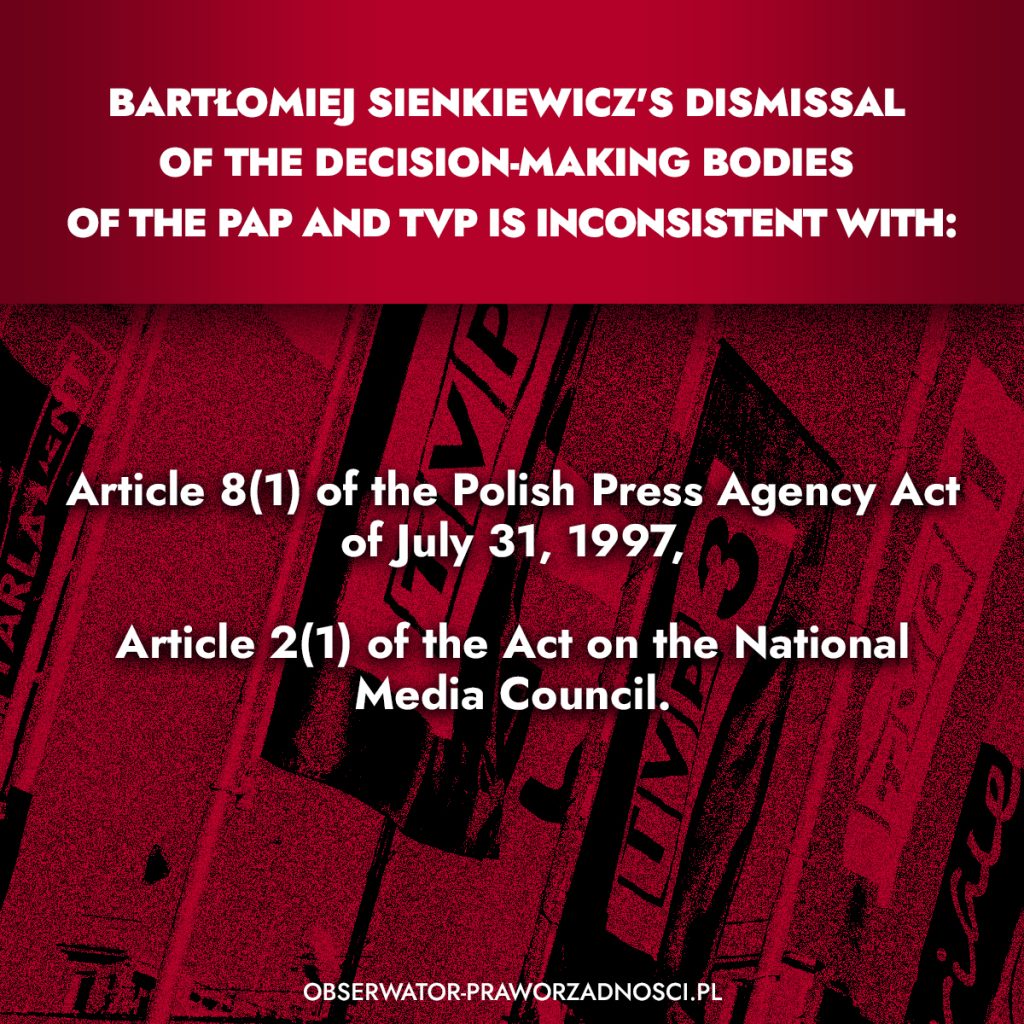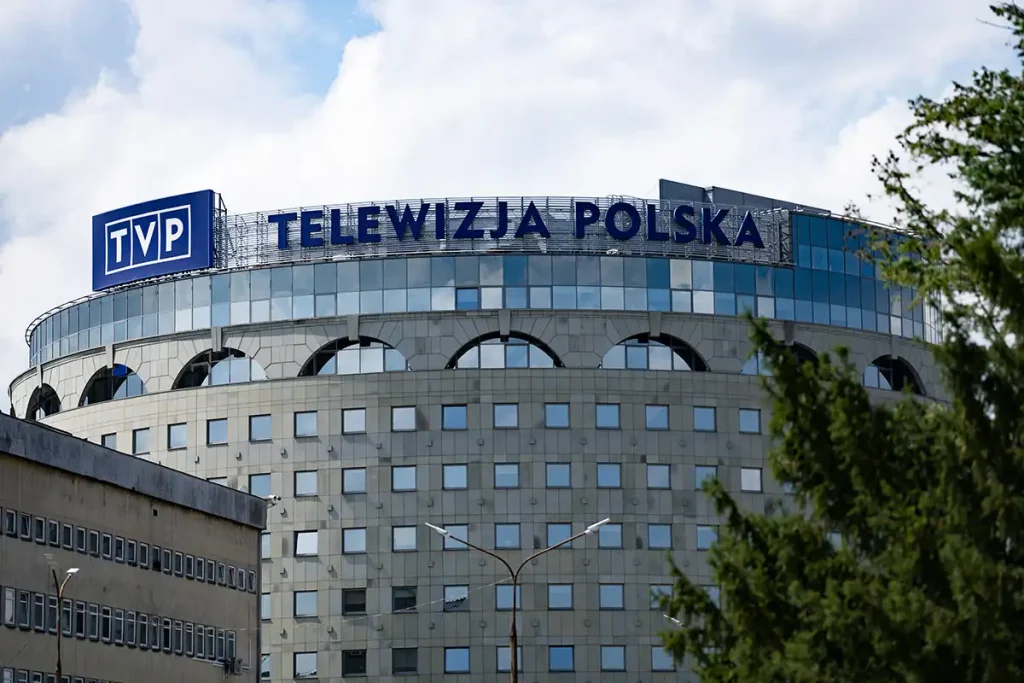An unlawful attack on public media took place based on a resolution of the Polish Sejm of December 19, 2023 on the restoration of legal order and the impartiality and integrity of public media and the Polish Press Agency. On the same day, the acting Minister of Culture and National Heritage, Colonel Bartlomiej Sienkiewicz, as the body exercising the ownership rights of the State Treasury (which holds 100% of the shares in the Companies), acting under the provisions of the Commercial Companies Code, dismissed the existing Chief Executives of the boards of Polish TV (Telewizja Polska S.A.), Polish Radio (Polskie Radio S.A.) and Polish Press Agency (Polska Agencja Prasowa S.A.), as well as the supervisory boards of these companies. The Minister appointed new supervisory boards in their place, which appointed new management boards of the companies. The Minister’s actions were undertaken in violation of statutory provisions.
The Minister justified his decisions with the provisions of the aforementioned resolution of the Sejm, which called on the State Treasury, represented by the ownership body of the companies carrying out the public mission of radio and television broadcasting and the Polish Press Agency S.A., to take immediate corrective measures to depoliticize the public media until appropriate legislative solutions are enacted and implemented.
In justifying its decision, the Sejm of the Republic of Poland referred, first, to the failure to implement the Constitutional Tribunal’s December 13, 2016 ruling (ref. K 13/16), erroneously attributing to the ruling that it declared unconstitutional the entrustment of the appointment and dismissal of public media authorities to the National Media Council, while the CT judgment (K 13/26) regarded depriving the National Broadcasting Council of participation in these processes and transferring these powers to the competent minister. Secondly, the resolution pointed to the flawed appointment of the authorities of the companies carrying out the mission of the public media and the Polish Press Agency S.A. following „unconstitutional” amendments to, among others, the Broadcasting Act of December 29, 1992, and the Polish Press Agency Act of July 31, 1997. It should be pointed out, however, that the provisions of the Act on the National Media Council have so far not been the subject of a Constitutional Tribunal ruling that would overrule them in any respect. Hence, they enjoy the presumption of constitutionality. It should also be recalled that the Sejm does not have the authority to assess the constitutionality of laws – in the event that MPs are convinced that a particular piece of legislation raises doubts as to its compliance with the Polish Constitution, they should use their powers within the legislative process.
In response to the unprecedented and misleading resolution of the Sejm, the position was taken by President of the Republic of Poland Andrzej Duda in a letter dated December 20, 2023, addressed to the Prime Minister. The President first recalled that the sources of universally binding law are, according to Article 87 of the Constitution, the Basic Law, statutes, ratified international agreements and regulations. Since this catalog is closed, resolutions of the Sejm do not constitute acts of universally binding law, i.e., they have no legal force, and no bodies can take action against citizens based on them.
In addition, the President of the Republic recalled that the body with jurisdiction over the appointment and dismissal of the members of the governing bodies of public broadcasting units and the Polish Press Agency is exclusively the National Media Council (Article 2(1) of the Act of June 22, 2016 on the National Media Council). Moreover, the judgment of the Constitutional Tribunal of December 13, 2016, cited in the Sejm’s resolution in question, found only the provisions of the Act of December 30, 2015, amending the Broadcasting Act, to be unconstitutional. It should be noted that the judgment in question did not declare the Law on the National Media Council unconstitutional. Any change in this regard requires the intervention of the legislature and the enactment of new legislation.
In the context of the unlawful actions of the Polish Government in preventing the normal functioning of the public media, it should also be pointed out that:
- according to Article 8 (1) of the Act of July 31, 1997 on the Polish Press Agency, members of the PAP Board of Directors, including the Chairman of the Board, are appointed and dismissed by the National Media Council. Consequently, the application of the provisions of the Commercial Companies Code invoked by Colonel Sienkiewicz is excluded. This follows not only from the conflict of legal rules (lex specialis derogat legi generali), but also from the literal content of the Act on the Polish Press Agency, which provides in Article 5 that the Commercial Companies Code applies to PAP only to the extent not otherwise regulated by the content of the Act on the Polish Press Agency;
- the decision to dismiss the Supervisory Board and the Management Board of Telewizja Polska S.A. is inconsistent both with Article 2(1) of the Act on the National Media Council, but also with the company’s articles of association. According to § 13 of the Articles of Association of Telewizja Polska S.A., members of the Management Board, including its President, are appointed and dismissed by the National Media Council;
- The actions of the Minister of Culture and National Heritage, Colonel Sienkiewicz, result in the discontinuation of public television channels: TVP Info, TVP 3 (regional broadcasters), and TVP World. As a result, these entities are not fulfilling their obligations under their contracts (for example, in terms of presenting commercials). This exposes Polish Television to huge financial losses, and thus the actions of the Ministry of Culture and National Heritage and all those allegedly appointed to the TVP authorities are actions to the detriment of the company, which may even involve criminal liability;
- outsiders were allowed to work in the buildings of Polish Television – without any legal basis, and therefore in violation of labor laws and health and safety standards. In turn, TVP’s employees and contractors were not allowed to work, which may also entail financial liability for the company, and therefore constitutes an act to its detriment.
Acting in accordance with the law should include, first of all, implementation of the Constitutional Tribunal’s ruling of December 13, 2016, i.e. amending the law to the extent indicated by the Court. Only after that, could possible action be taken regarding the management and supervisory boards.
The alleged legal basis for the action of the Minister of Culture and National Heritage has been challenged by a group of deputies to the Constitutional Tribunal, which will hear the case (ref. K 29/23) on January 16, 2024, at: 10 a.m. At the same time, the Constitutional Tribunal issued a protective order, ordering the Minister of Culture and National Heritage to refrain from making changes to the boards of directors and supervisory boards of public broadcasting companies, but this was ignored.




